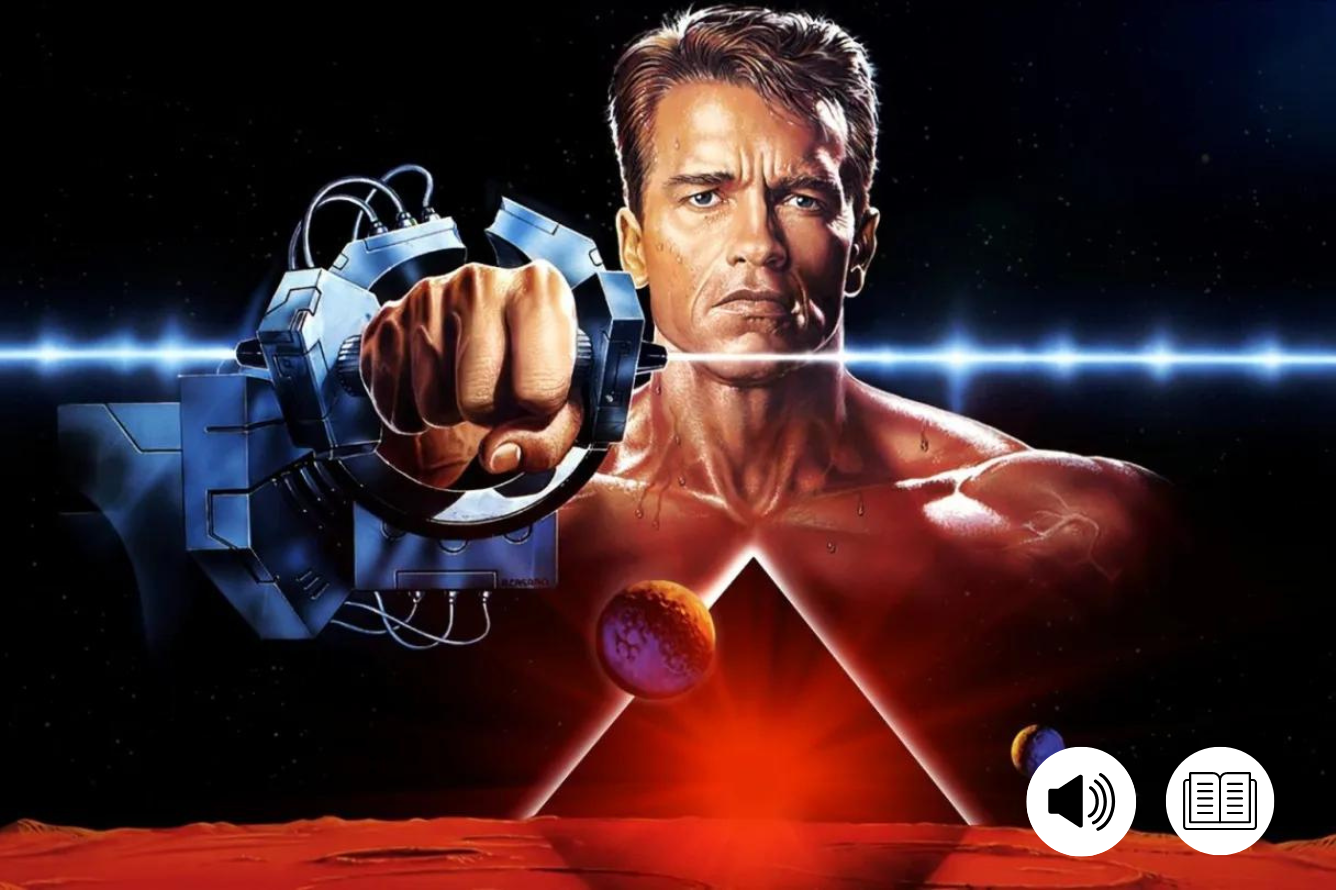You can also listen to Tessa B. Dick: Searching for My Husband in Verhoeven’s Movie on Apple Podcasts, Google Podcasts, Spotify, or RSS Feed.
When I first saw Total Recall in the theater in 1990, I had to threaten to call the manager because some teenagers sitting behind me kept hooting and shouting every time they saw a naked or scantily-clad woman on the screen. I did not pay $6 to listen to them for two hours. What impressed me most strongly was the way that film captured my husband’s sense of humor. On subsequent viewing, I have discovered many more layers of meaning in the film, despite its obvious reliance on action and special effects, which I believe to be unnecessary to carry the plot. The story runs much deeper than action and adventure, which you will see if you pay attention to the underlying themes. Sadly, Philip K. Dick did not live long enough to see the many films that his work inspired. Starting with Blade Runner in 1982, many films have been based on or inspired by his novels and stories.
He did see the rough cut of Blade Runner, but he never had the opportunity to see the finished film. His premature death in March 1982 ended a brilliant career that was just beginning to bring him the recognition he so greatly deserved.
Paul Verhoeven’s 1990 film Total Recall turns on a more intellectual premise than most viewers expect from a science fiction movie. Based on Philip K. Dick’s short story We Can Remember it for You, Wholesale (first published in The Magazine of Fantasy & Science Fiction, April 1966), it raises questions about whether we can trust our own memories. Did what we remember really happen? Did it happen the way we remember it? The premise asks these questions and more, but we must provide our own answers.
In the story and the film, a man whose lifelong dream has been to go to Mars as a secret agent finds a way to make his dream come true by having false memories implanted in his brain. Unfortunately for him, he really has been to Mars, but he is not supposed to remember. In fact, his real memories of what he did on Mars have marked him for death. These issues underlie both the Paul Verhoeven film and the story on which it is based.
Capturing the Humor of Philip K. Dick
We Can Remember it for You, Wholesale explores the question of whether we can trust our own memories in a more gentle way than the action-adventure film. Douglas Quail – Dick’s protagonist, rather than the muscular Quaid of the movie – attempts to fulfil his childhood dream of visiting Mars by purchasing false memories at the offices of Rekal Incorporated, but things immediately go wrong. Rekal uses a drug cocktail to induce hypnotic sleep so they can implant memories of the customer’s fantasy vacation.
When the drugs take effect, Quail reveals that his fantasy about conducting a secret mission on Mars is really a buried memory. As a matter of national security, he must never recall his mission to Mars, where he assassinated a major political figure.
On one level, this tale reflects the film The Manchurian Candidate (1962) as a source of inspiration, while it also brings to mind Lee Harvey Oswald’s firm denial of having shot President Kennedy or anyone else on that November day in 1963. In private conversations, Dick speculated that perhaps Oswald’s memory was erased, or perhaps he was subjected to mind control, as was the fictional hero of The Manchurian Candidate.
Beyond that, however, the story presents an underlying fantasy that is also true but which has implications reaching far beyond the fate of the main character. The 1990 film Total Recall, starring Arnold Schwarzenegger and Sharon Stone, takes the story as a starting point and then runs in a new direction. Rather than unpeeling the levels of false and real memories, the film presents a series of action scenes with plenty of violence. The mild-mannered clerk of the story becomes a burly, rough-edged construction worker in the film. Interestingly, the film captures Philip K. Dick’s sense of humor which, while often dark, sometimes makes us stop and think. For example, the robot taxi driver in the film fails to understand what the hero means when he yells, “Just go!” The robot insists on a specific destination before he will make the car move. That scene reflects our frequent frustration with labor-saving technology, which Dick brilliantly depicts in his stories and novels.

Whereas Quail in the story negotiates with his adversaries, Quaid in the film meets force with greater force. Schwarzenegger fits the role of the action hero Douglas Quaid, although the Douglas Quail of the short story is much more of an ordinary man who feels more empathy than the film hero who kills his co-workers and beats up his wife. Of course, those actions are justified because his co-workers attacked him first and his wife is really an agent sent to spy on him and prevent him from remembering his mission to Mars. Sharon Stone makes the role of Quaid’s fake wife believable, and she makes it easy to applaud him for beating her up when she attacks him. The hero of Dick’s story, on the other hand, saves the world through an act of kindness. His wife in the story nags him and makes him unhappy, but she is not the cold bitch of the film. She is simply unhappy with her daydreaming husband who, like Walter Mitty, lets opportunity pass while he immerses himself in fantasy.

Mars in the Movie vs the Story
The film takes its most radical divergence from the story when Quaid actually goes to Mars. He finds himself in a scenario reminiscent of Dick’s novel The Unteleported Man (1966). Colonists have been forced into slave labor mining minerals near Olympus Mons, the massive volcano on Mars. Their labor supports the war effort and the lavish lifestyle of their overlord Cohaagen, who needs Quaid alive for reasons that become somewhat clear only in the last half hour of this two-hour film. If the colonists defy the authorities in any way, they are deprived of oxygen. The thin, almost nonexistent atmosphere on Mars provides a pivotal plot point that leads to a spectacular ending.
Unlike the calm, reasonable hero of the story, Schwarzenegger’s character is frightened and confused. The only reason he has any idea what to do is that receives instructions from recordings that he made for himself before the authorities wiped his memory. His antagonists have gone to great lengths to convince him that he is still dreaming, but on Mars, he meets the woman of his fantasies and she is real. On his arrival at the colony on Mars, the film morphs into a story about slavery and environmental degradation, rather than a simple action thriller. While it does not preach, the film does present the dark side of colonization and servitude. Many of the children born in the mining colony are mutants created by the radiation that flows through the thin shielding over their homes. Quaid walks past them in search of someone he must meet, and he does not seem to care about them. However, their interactions with each other make them sympathetic characters.








